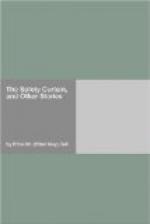“Oh, is he that man?” Eagerly she broke in. “Does he live in that perfectly exquisite old red-brick house on the water with the wheel turning all day long? Oh, isn’t he lucky?”
“I doubt if he thinks so,” said Hugh Chesyl. “I’ve never met a contented farmer yet.”
“I don’t like people to be too contented,” said Doris perversely. “It’s a sign of laziness and—yes—weakness of purpose.”
“Oh, is it?” Again he uttered his good-tempered laugh; then, as he began to drink his tea, he gradually sobered. “Has anything happened lately to make you specially discontented with your lot?” he asked presently.
Doris’s brows contracted. “Things are always happening. My stepmother gets more unbearable every day. I sometimes think I will go and work for my living, but my father won’t hear of it. And what can I do? I haven’t qualified for anything. The only thing open to me is to fill a post of unpaid companion to a rich and elderly cousin who would put up with me but doesn’t much want me. She lives at Kensington, too, and I can breathe only in the country.”
“Poor little girl!” said Hugh kindly.
“Oh, don’t pity me!” she said quickly. “You can’t do anything to help. And I shouldn’t grumble to you if there were anyone else to grumble to.” She leaned back against her sheaf with her eyes on the sunlit water below. “I suppose I shall just go on in the same old way till something happens. Anyhow, I can’t see my way out at present. It’s such a shame to be unhappy, too, when life might be so ecstatic.”
“How could life be ecstatic?” asked Hugh, passing up his cup to be refilled.
She threw him a quick glance. “You wouldn’t understand if I were to tell you,” she said. “It never could be—for you.”
He sighed. “I know I’m very limited. But it’s a mistake to expect too much from life, believe me. Ask but little, and perhaps—if you’re lucky—you won’t be disappointed.”
“I would rather have nothing than that,” she said quickly.
Hugh Chesyl turned and regarded her curiously. “Would you really?” he said.
She nodded several times emphatically. “Yes; just live my own life out-of-doors and do without everything else.” She pulled a long stalk of corn from the sheaf against which she rested and looked at it thoughtfully. Her eyes were downcast, and the man in the punt could not see the deep shadow of pain they held. “If I can’t have corn,” she said slowly, with the air of one pronouncing sentence, “I won’t have husks. I will die of starvation sooner.”
And with that very suddenly she rose and walked round the sheaf.
The movement was abrupt, so abrupt that Hugh Chesyl lifted his brows in astonishment. He was still more surprised a moment later when he heard her clear, girlish voice raised in admonition.
“I don’t think it’s very nice of you to lie there listening and not to let us know.”




